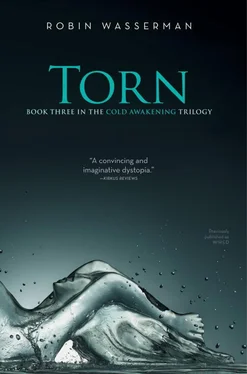That’s what I’d thought.
Because, again, that’s what I’d been told.
“Why do they need so many?” I asked dully. According to the records, they’d downloaded more than a hundred of us into various prototypes. Why not lobotomize one brain and download it into everything? More efficient—still evil.
“I think…” Zo hesitated, as if understanding it somehow made her complicit. “I think it increases the chances of success. Different neural patterns adjust better to different machines. Some don’t work at all.”
“So this is their testing ground.” I turned back to the video feeds of the padded cells, watching the stumbling machine and remembering what it had been like for me at the beginning, learning to walk. Training my brain to control the artificial body. They’d scared us into cooperating with the tedious rehabilitation process, making it all too clear what would happen if our neural patterns failed to adapt. We’d be frozen, unable to move or speak or see, trapped inside a head with no window to the world, no control. Buried alive inside a mechanical corpse.
“They let them learn,” Zo said, “give them commands, see what happens, and when they find a neural pattern that works—”
“Payday.” I backed away. “Can you deal with this?” I asked. “Download whatever you can to your zone, get some pics, evidence, whatever—”
“I got it,” Zo said. She didn’t ask what I’d be doing while she got stuck with all the work.
I returned to the corridor. To the cells. I stood at one of the windows, watching a miniature tank ram itself into a wall, over and over again. I tapped at the glass, but nothing happened. I don’t know what I was expecting—it wasn’t an animal.
It . I was thinking like them.
But it wasn’t an it .
It was, had been, a he. Or a she.
Maybe it had been someone I knew, maybe even—
Maybe it didn’t matter. It wasn’t a person inside that tank. It was electronic data, some of which happened to resemble the data inside our heads. It was bytes of information, flickers of light. Nothing more. It didn’t have any effect on us. Its existence was irrelevant.
But if it was nothing, just an imperfect copy, just data, then so was I. And if I was a person, a someone , then maybe so was it. Thinking and feeling at some primal level, dumb and mute and trapped, a slave to a stranger’s commands.
Zo came up beside me. She didn’t speak, and knew better than to touch me. We stood side by side. “I don’t know what to do,” I said.
“You will.”
“We were supposed to be a fairy tale.”
Jude didn’t believe it, not at first. We had to show him the files we’d hacked and the vids we’d taken, and even then, I could tell, he wanted to think we’d somehow gotten ourselves turned around, stumbled into an alternate realm with no bearing on the real world. It was the first time I’d ever seen him underestimate the boundaries of org depravity.
On its surface this was less brutal than the antiskinner attacks and lynchings, less bloody than the corp’s initial foray into the download technology, its path littered with the corpses of unwilling “volunteers.” But I thought I understood Jude’s uncertainty and—though he never would have admitted it—his panic. Because this was coordinated and systemic. For all we knew, it was the reason BioMax had pursued the download technology to begin with. Certainly, supplying the military industrial complex paid better than a semihumanitarian mission to heal the broken children of the wealthy. Not to mention the domestic-sector applications, which we’d all seen. Which we’d all—the self-revulsion at this thought was overwhelming—used without a second thought.
“How could I be this stupid?” Jude said, as we huddled in his car and told him everything.
“How were you supposed to know?” I asked. “I worked there, and I didn’t.”
“Exactly. Stupid.”
I wasn’t going to fight with him, even if it would have been easier. “You’re right. We were stupid. Now what?”
“You’re asking him ?” Zo said.
“I should be asking you?”
“Since when do you ask anyone?”
I wouldn’t have thought I had to remind her that things changed.
“Bossy big sister doesn’t exactly translate into fearless leader,” Jude said.
“Asshole. I got us this far, didn’t I?”
“With my plan,” he pointed out.
“My execution.”
“Congratulations,” Zo said. “You’re both equally useless.”
“This doesn’t have to change anything,” I said. “We can still sell the info to Aikida.”
Jude frowned. “And let them do the same thing?”
“So we go public,” I suggested. “This has to be illegal.”
“Not if they don’t want it to be,” Jude said.
“So what’s your brilliant idea?”
He didn’t answer. That was the worst part. Jude, the one person who shouldn’t have been surprised, had somehow failed to question the fundamental truth of our existence. That we were the only copies. That each of us existed as a unique unit, a single person, our identities protected and sacrosanct. It was the lie that allowed us to be human, wasn’t it? Because how could I be Lia Kahn if there was a second Lia Kahn wandering the earth, a third, a fourth, a hundredth—how could I be Lia Kahn if there was a battlefield of Lia Kahns, tanks and planes and, for all I knew, vacuum cleaners, all of them somehow, not quite, but mostly me ? If BioMax could lie about this, they could lie about anything. They could put a copy of my brain into another body, awaken as many Lia Kahns as they liked.
Stripped-down personalities were still personalities; lobotomized brains could still think. Artificial intelligence dictated intelligence. So what made us people and them machines?
Nothing , I thought. To BioMax, we’re all just things.
There’s no sin in lying to a thing.
“So we’re screwed,” Zo said.
“ We’re screwed,” I said. “You’re…”
“Not involved. Right. Somehow I forgot.”
I couldn’t stop saying the wrong thing. “Let’s just go home,” I said. Then, because someone had to, even if it was a lie: “We’ll figure something out.”
The real problem: This wasn’t a flaw in the system. This was the system itself. This was the corp that owned us, body and mind. This wasn’t something we could fight. But we were going to have to.
I dumped Zo and Jude at Riley’s place. Zo lunged for the shower, as if eager to wash off the day. I understood the impulse. Jude was more than happy to ensconce himself on Riley’s turf to keep an eye on Sari—the two of them circled each other warily like rival alley cats, and I half expected one to start peeing to mark the territory. True to form, Riley didn’t ask questions.
“Let’s go somewhere,” I told him.
“It’s the middle of the night.”
“I don’t care. Please.”
He gave in.
Only one problem: I didn’t know where I wanted to go. So we drove aimlessly, watching the muddy browns and grays stream by the window, the river of concrete and mud and smog. The water, that’s what I thought of first, the dead city beneath the sea. Our place, with its silent buildings and frozen cars, our city of algae and coral and darkness. It was the first place Riley had taken me, the first place he’d kissed me, back when we’d fit with jigsaw perfection. But we’d gone back too often these last few months, neither of us admitting what we were trying to do. It was a way of going backward. Beyond that fence nothing existed except us. We didn’t talk there, not like we used to. We ducked beneath the water and held hands and let the current carry us wherever it wanted to go. We hid.
Читать дальше












